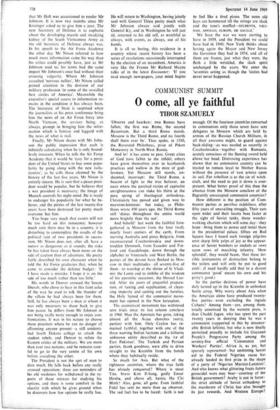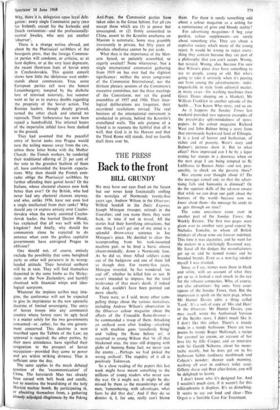0 come, all ye faithful
COMMUNIST SUMMIT TIBOR SZAMUELY
'Observe and hearken: two Romes have fallen; the first was Rome, the second Byzantium. But a third Rome stands. Moscow is the Third Rome, and no fourth shall there ever be'. Thus spake, in 1510, the Reverend Philotheus, prior of Pskov Monastery in North-West Russia.
And lo! it has come to pass. Great cities of God have fallen to the infidel, others have given themselves over to heathenish practices and wallow in the mire of god- lessness. Yet Moscow still stands, un- daunted, incorrupt: the Third Rome, a beacon of light to the true believer, an oasis where the parched victim of capitalist unrighteousness can slake his thirst at the pure spring of theological orthodoxy. Christianity has passed and given way to marxism-leninism: but today, as Philo- theus wrote 450 years ago, the Third Rome still 'shines throughout the entire world more brightly than the sun'.
And behold! last week the faithful fore- gathered in Moscow from the four (well, nearly four) corners of the earth. From starving Australia and pious Bulgaria, from reconsecrated Czechoslovakia and down- trodden Denmark, from Ecuador and Fin- land and Guadeloupe, down through the alphabet to Venezuela and West Berlin, the parties of the devout have flocked to Mos- cow in their multitudes—all seventy-five of them—to worship at the shrine of St Vladi- mir the Lenin and to imbibe of the wisdom of his apostolic successor, the blessed Leo- nid. After six years of prayerful prepara- tion, of fasting and supplication, of clean- sing impurity and casting out the heretics, the Holy Synod of the communist move- ment has opened in the New Jerusalem.
The ecumenical movement has withstood sore trials since its last solemn conclave in 1960. Mao the Apostate has gone, taking almost all the Asian churches (sorry, parties) with him. Only Ceylon has re- mained faithful, together with one of the three warring Indian factions and a hitherto unknown entity described as the 'CP of East Pakistan'. The Turkish and Persian parties, thank goodness, were able to drive straight to the Kremlin from the hotels where they habitually reside.
So much for Asia. But what of the righteous countries, where the true faith has already conquered? Where is stout Tito, brave Kim II-Sung, godly Enver Hoxha, and above all, heroic Ho Chi Minh? Alas, gone, all gone. Even faithful Fidel has sent no more than an observer. The sad fact has to be faced: faith is not enough. Of the fourteen countries converted to communism only those seven have sent delegates to Moscow which are held by armies of the Russian Church Militant, in all their awesome might, to guard against back-sliding—as was needed so recently in Czechoslovakia—together with Rumania, acutely conscious of the flaming sword held above her head. Distressing experience has shown that no communist country can be trusted to remain loyal to Mother Russia without the presence of vast armies upon its soil. For rebellion is as the sin of witch- craft, and the need to put it down is ever- present. What better proof of this than the absence from the Moscow conclave of the flagrantly unoccupied communist countries?
How different is the position of Com- munist parties in partibus infideliutn, after fifty years of unavailing struggle. Their eyes open wider and their hearts beat faster at the sight of Soviet tanks, those wonder- working chariots which will some day—they hope—bring them to power and instal them in the presidential palace. Often on Red Square have I heard such foreign pilgrims emit sharp little yelps of joy at the appear- ance of Soviet bombers or rockets or rows upon rows of marching infantry. 'How splendid', they would beam, 'that these ter- rible instruments of destruction belong to the toilers and will only be put to good ends'. (I need hardly add that to a devout communist 'good' means his own and his party's good.) So the parties desirous of power have duly turned up in the Kremlin in unbroken battle array. Why worry about Asia when the Americas alone have produced twenty- five parties—even excluding the ingrate Cubans? Among them—yes, among them, totally unnoticed by the western press, is dear Cheddi Jagan, who has spent the past twenty years in denying that he was a communist (supported in this by innumer- able British leftists), but who is now finally permitted proudly to include his Guyanan People's Progressive Party among the seventy-five official 'Communist and Workers' Parties'. Africa is, as yet, but sparsely represented—but unstinting Soviet aid to the Federal Nigerian cause has already landed its first prize in the shape of a party of 'Nigerian Marxist-Leninists'.
And who knows what glittering fruits future genocidal wars may bear—courtesy of the British government? Araby is out in force: the strict attitude of Soviet orthodoxy to the murderers of Christ has also brought its just rewards. And Western Europe?
Why, there it is, delegation upon loyal dele- gation: every single Communist party (two for Ireland), except for the Icelandic and Dutch revisionists—and the professionally= neutral Swedes, who sent yet another `observer'.
There is a strange notion abroad, put about by the Pharisaical scribblers of the bourgeois press, that the foreign Commun- ist parties will condemn, or criticise, or at least deplore, or at the very least deprecate, the recent illustrious feats of Soviet arms in Czechoslovakia. This quaint conceit shows how little the idolatrous west under- stands about communism. True, some European parties (all save the honest Luxemburgers), tempted by the diabolic lure of televised notoriety, last summer went so far as to express doubts regarding the propriety of the Soviet action. The Russian leaders, though deeply grieved, turned the other cheek and uttered no reproach. Their forbearance has now been repaid a hundredfold. The infernal hopes of the imperialist infidel have been dashed to the ground.
They had assumed that the peaceful entry of Soviet tanks into Prague would turn the toiling masses away from the CPS, unless these latter broke with the Mother Church: the French workers, by renderint their traditional offering of 21 per cent of the vote to the grandest Stalinist of them all, have confounded the knavish expecta- tions. Why then should the French com- rades oblige the Pharisaical scribblers by further offending their genial hosts? Or the Italians, whose electoral chances now look better than ever? Or the British, who had never had any electoral chances anyway, and who, unlike 1956, have not even lost a single intellectual from their ranks? Why should any cr. express anxiety over Czecho- slovakia when the newly anointed Czecho- slovak leader, the learned Doctor Husak, has explained that all was well with his kingdom? And finally, why should the communists alone be expected to do penance when even the godless capitalist governments have consigned Prague to oblivion?
One should not, of course, entirely exclude the possibility that some benighted party or other will persevere in its wrong- headed attitude. Their heretical outburst will be in vain. They will find themselves deposited in the same limbo as the Malay- sians or the New Zealanders, and harshly chastised with financial whips and ideo- logical scorpions.
Whatever the impious scribes may ima- gine, the conference will not be expected to give its imprimatur to the new apostolic doctrine of limited sovereignty. The entry of Soviet troops into any communist country where heresy rears its ugly head is a matter solely for the two governments concerned—or, rather, for the one govern- ment concerned. This doctrine is now inscribed upon the Tablets of the Law; nv approval is required; the other parties, by their mere attendance, have signified their resignation to the prospect of Soviet occupation—provided they come to power and are within striking distance. That is sufficient unto the day.
The same applies to the much debated question of the 'excommunication' of China. The heresiarch Mao has already been cursed with bell, book and candle, not to mention the brandishing of the holy Marxist nuclear bomb. By participating in, or absenting themselves from, a gathering already adjudged-illegitimate by the Peking
Anti-Pope, the Communist parties have taken sides in the Great Schism. For all CPS except those which are (1) in power but unoccupied, or (2) firmly committed to China, assent to the Kremlin anathema on Maoism is automatic. Some may grumble irreverently in private, but fifty years of absolute obedience cannot be put aside.
What then is the importance of the Mos- cow Synod, so patiently assembled, so eagerly awaited? None whatsoever. Not a single international communist gathering from 1919 on has ever had the slightest significance: neither the seven congresses of the Communist International, nor the thirteen plenary sessions of the Comintern's executive committee, nor the three meetings of the Cominform, nor yet the grand assemblies of 1957 and 1960. Their theo- logical deliberations are forgotten, their sacerdotal resolutions unread. The real business of the international movement is conducted in private, behind the Kremlin's crenellated walls. The sole purpose of a Synod is to reassure the faithful that all is well, that God is in his Heaven and that the Third Rome still stands. And no fourth shall there ever be.



































 Previous page
Previous page